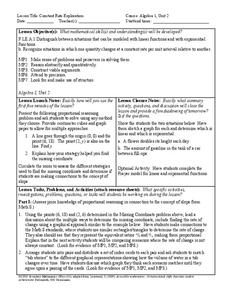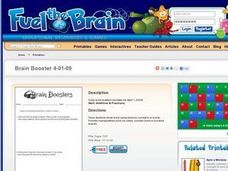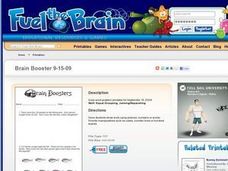Mathematics Assessment Project
Skeleton Tower
Who doesn't like building blocks? In the task, pupils use a given diagram of a tower to determine the number of needed blocks. Using this information, pupils then develop a function rule relating the height of the tower to the number of...
EduGAINs
Ratio and Proportion
Do these items have the same ratio? Through a learning contract, pupils master proportions by practicing proportions via word problems, graphs, and with manipulatives. An exit ticket checks for understanding at the end of the...
Radford University
A Change in the Weather
Explore the power of mathematics through this two-week statistics unit. Pupils learn about several climate-related issues and complete surveys that communicate their perceptions. They graph both univariate and bivariate data and use...
Mathed Up!
Nets, Plans, and Elevations
A dimensional resource teaches viewers to recognize 2-D views of 3-D objects and how to match nets with their 3-D figures. Individuals draw different views of three-dimensional objects including views from the front, side...
02 x 02 Worksheets
Inverse Functions
Young mathematicians look for patterns in inverse functions as they relate to the original functions. The comprehensive lesson emphasizes vocabulary throughout as well as algebraic and graphical characteristics of the inverse functions.
Virginia Department of Education
Simplifying Square Roots of Whole Numbers
Simplify your life by using a resource on simplifying square roots. Pupils review square roots and calculate values of given radical expressions using a calculator. The instructional activity concludes by having them consider the results...
California Education Partners
Yum Yum Cereal
Design an efficient cereal box. Scholars use set volume criteria to design a cereal box by applying their knowledge of surface area to determine the cost to create the box. They then determine whether their designs will fit on...
Howard County Schools
Constant Rate Exploration
Question: What do rectangles and bathtub volume have in common? Answer: Linear equations. Learn how to identify situations that have constant rates by examining two different situations, one proportional and one not proportional.
101 Questions
Dandy Candies
Package design is an economic necessity. Young scholars assume the role in an interesting inquiry-based lesson. Given 24 cubic shaped candies to package, they must determine the arrangement that uses the least amount of cardboard to...
Concord Consortium
Build a Box
Strive for gold with an informative resource. A short task challenges learners to investigate the thickness of a box made from a given volume of gold. The box must have specific dimensions, so setting up and solving a literal equation is...
Curated OER
Empirical Probability
In this empirical probability worksheet, 8th graders solve 10 different problems related to determining the probability of a number. First, they determine the probability of selecting a letter other than a consonant. Then, students...
Curated OER
Yummy Shapes
Students explore space shapes learning about edges, corners, and faces. They enjoy shape soup as a culminating activity.
Curated OER
Probability Problems
In this probability worksheet, 8th graders solve 10 different word problems that involve the words AND or OR. First, they roll a die and determine the probability that the value of roll will be a multiple of 5 or 11. Then, students use a...
Curated OER
Subtraction Shopping
Students subtract two digit numbers. They check each other's answers for accuracy.
Curated OER
Probability
In this probability worksheet, 8th graders solve 10 different problems that include determining various events of probability. First, they determine the odds of an event given the ratio. Then, students use a fraction to express the...
Fuel the Brain
Addition & Fractions
Solve addition problems and problems involving fractions with ease! Your class will have a better grasp on these concepts after completing this 2 problem worksheet.
Curated OER
Money
Having good money skills will be beneficial for your young learner to take with them for the rest of their life. Your class will solve for two word problems where they will draw the money depicted and state a total amount.
Fuel the Brain
Separating
Using simple subtraction, your class will understand how to separate information that is given for the solution.
Curated OER
Addition/Join Result Unknown; Fact Family-4
By combining amounts from two parts of the day, your students will find a total sum.
Fuel the Brain
Addition & Subtraction
Do your young learners know how to recognize a number if it is spelled out instead of being shown as numerals? They will solve two-digit and three-digit addition problems by recognizing the word and transferring that number into numerals.
Fuel the Brain
Solve Problems by Making Hundreds
If your learners understand how to group in hundreds, this worksheet is a great way to practice this skill. The story problems ask how many groups of hundreds can be formed and if any are left over.
Fuel the Brain
Combine Fractions to Describe Parts of a Whole
If students don't finish their whole lunch one day, a fraction of it will remain. On a second day, if they don't finish their lunch, another fraction will remain. What is the sum of those fractions?
Curated OER
Equal Grouping, Joining/Separating
Fishing is fun because you can share what you catch. Learners test their addition skills to see how many fish are caught by each person. Another total is given, but all the fish have to be distributed equally. Hope your learners...
Fuel the Brain
Joining by Tens
Used as a warm-up or exit ticket, your class will enjoy solving problems about dinosaurs and blocks. Adding 10 to any number may be tricky, so allow your learners to use manipulatives or draw on the worksheet itself!

























